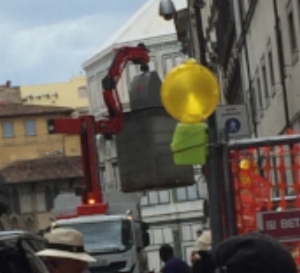Going Around
As I was taking a run last week, I ran into this situation:
Immediately I had two different reactions. I first thought, "What lazy government worker couldn't properly correct or coordinate the telephone support and instead did a quick fix?" Then I thought, "Someone's taking initiative- at least they put in some type of walkway to prevent a problem of having people trip over the wood telephone support."
The more I thought about it, the more I thought, what a great metaphor about life. Many times we travel down a straight path and nothing obscures where we are going. Then due to some type of internal or external change, our straight path gets blocked. We have to decide how we are going to go- will we try and remove the obstacle, will we struggle through or will we go around?
When I have obstacles I seem to choose the former. I will keep trying to remove the obstacles. I try so hard to keep the path clear. I plan and rearrange plans so that I can continue what I think is the straight path. Many times by the rearrangement of plans or the slight tweaking of them, I can keep the path and its focus clear. But every once in a while, something will pop up into my path and I have to figure out what I should do next.
At those moments I have to consider removing the obstacles in the path. There are times when I must stop and assess the situation. The road blocks may be too large that I cannot simply push aside. I have to remove the obstacles before I can go any further on my journey. It might be the obstacle of asking for forgiveness or for forgiving another. It might be the obstacle of temptation in all its forms from benign to dangerous. Or, it might be the obstacle of pride, thinking too highly of myself and I get in my own way.
What the picture reminds me is that sometimes I cannot go the direction I planned. The path is blocked and there is no way through it and there is no way to remove the obstacle. I have to set up a way around. In the cardiac medical model, many people develop collateral circulation- veins and arteries that by-pass a direct blockage by using minor vessels as the alternate path. The body will naturally set that up in order to preserve life.
I was thinking of how that affects me in this season of life. As you know I have been struggling with balance in my life lately. But I am wondering if what I think is the correct balance is really my trying to force life through a set path. Perhaps for the time being, I need to circle around and try a different approach. Maybe I need to look for a way around.
The new way around may take different forms: Do I need to lower some expectations for myself and others? How should I view the distractions in my life? Should I spend my energy on those things I "think" are distractions? Are these really obstacles or my new path? Should I go with the problem rather than fighting it?
With my current writing plan, do I need to change it? Should I think about developing a side path since the regular path is, for the time being, blocked? I am going to experiment with a weekly posting: Wednesdays at the Well. My plan is to have a weekly posting (rather than M,W,F) so that I can concentrate on a devotional I am writing. Some of my postings may be entries and ideas for the book, other postings will be my normal comments on life and wellbeing but all of the postings will be geared towards mid-week inspiration.
What about you? Do you ever feel that your path is blocked? Did something just spring up or was it an obstacle you have always had? Do you need to remove the obstacle or do you need to go around?
“Wednesdays at the Well: A mid-week dose of inspiration. Blog postings each Wednesday.”
















